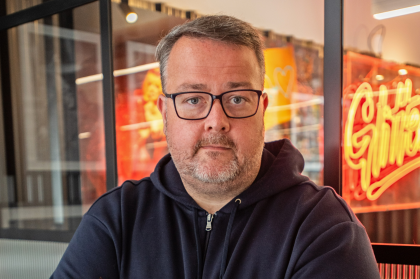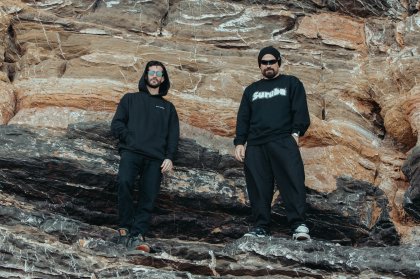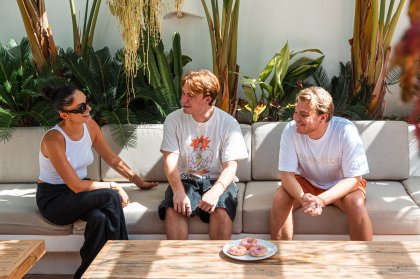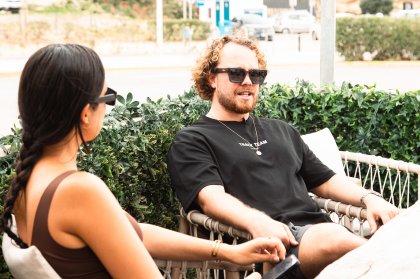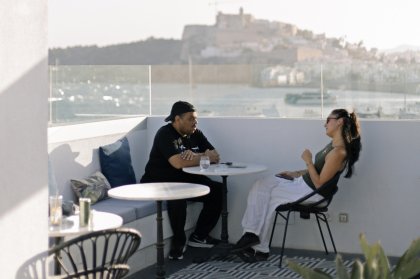Dogmatik Records boss Alex Arnout has been in the game for two decades, the same amount of time that many members of the flock he'll be playing to this summer has been alive. Between showing his face at Jamie Jones' Paradise event and Blue Marlin once respectively, he's a fixture on Magna Carta's Saturday evenings at Sankeys this year, playing alongside fellow UK house acts Josh Butler and No Artificial Colours.
Arnout's DJ career begun in the nineties on the Spanish island of Tenerife, eventually moving from the Canary to the Balearic Islands, a much more fitting spot for a DJ inspired by Detroit and Chicago. Arnout has since played iconic venues such as DC-10 for Circo Loco, Berlin's Watergate and fabric, to Rainbow Venues in Birmingham. Making music came a little later on, and he's featured on Crosstown, Phonetic and Hot Creations, releasing under different monikers.
Vanishing Point on Subb-an and Adam Shelton's One Records, showcases Arnout's taste for sleek, melodic house. Returning to the label in 2013, he collaborated with Chicago's hip-house original Tyree Cooper on One Nation. Having started his label Dogmatik in 2005, three years on saw the release of Maya Jane Coles' first track Sick Panda, as well as releases from Mark E, Peace Division, Burnski and Dan Ghenacia, including Dusky's Aaliyah sampled 2012 dancefloor smasher, Flo Jam.
No stranger to dance music, then, and dedicated to the cause. As he readies for his year in Ibiza, Alex Arnout reveals details on running a label for ten years, starting a new imprint and finding time to play with drum machines in-between.
Where were you at in your DJing career when you started Dogmatik ten years ago - what was the catalyst?
"I'd played at parties and places like Circo Loco, Dance Valley, Danzatoria (now Catwalk), Loop in Japan and lots more. Clive Henry from Peace Division gave me my first remix, which I did with my then partner Liam Sullivan as Ceramix. I'd worked for Milo Records & Arthrob and had been engineering and producing for nine years before starting the label, but all that meant nothing when I started Dogmatik. You're trying to appeal to a worldwide audience so you have to make sure the content is of a good quality. Reputation counts for nothing if the music isn't good."
Which moments stick out as significant since running your label?
"The label has given me no end of significant moments musically and artist wise. We've had great artists like Maya Jane Coles, Jovonn, Peace Division, Dusky and many more release with us, but what really sticks out for me is when I first set Dogmatik up. I had to walk around all the record shops in London dropping records in as no distribution company wanted to touch an unknown label with unknown artists at the time. To see it grow from that, to having our titles distributed all over Europe, Japan and the States, is something that always stays with me."
You launched Maya Jane Coles' with her first release Sick Panda and released Dusky's defining Flo Jam. Looking back at talent you supported early on, did you imagine they'd reach such success?
"Actually in both these cases, yes. I met Maya when she was eighteen and the music she was making then outshone 90% of the producers making music for my taste at the time, so I always knew she'd move on to great things. With Dusky the quality of tracks they were sending me were outstanding; their production values and the way the tracks exploded on the dance floor told me these guys would kill it too."
Do you have a favourite aspect of running the label?
"The whole thing: from A&R to receiving the release on vinyl, you hear the releases at so many different stages. From a rough demo, to mix down, to master, but nothing prepares you for how good it all sounds when you get the vinyl back. It still gets me."
"YOU HEAR THE RELEASES AT SO MANY DIFFERENT STAGES - FROM A ROUGH DEMO, TO MIX DOWN, TO MASTER - BUT NOTHING PREPARES YOU FOR HOW GOOD IT ALL SOUNDS WHEN YOU GET THE VINYL BACK. IT STILL GETS ME."
You're in the beginning stages of setting up a new label, with the first track on DMK released late last year. Can you tell us more about why you've decided to start a new imprint? And how the characteristics of the tracks differ from Dogmatik?
"DMK is a vinyl only label run by myself and my label partner Daren Nunes, we both grew up listening to early Detroit & Chicago tracks in the late 80s and wanted to push the modern version of this sound forward rather than hearing the same classics re-issued over and over again. So DMK was born, and we have great new artists in Stojche & Kuba Sojka who have also released on Dogmatik but both have evolved into something Daren and I recognised as the next generation and evolution of the Detroit/Chicago benchmark. We're on DMK002 at the moment, which is Stojche's Square Chapter EP, and we're awaiting test pressings of Kuba Sojka's Multiple Faces album, which should be out soon."
Your latest release, Touch, came from playing around on an 808, and the remix from Abe Duque pays homage to the Roland 303. Why do you feel more of an affinity to using analogue over digital?
"It just sounds fatter and is a lot easier and a lot more fun than sitting in front of a computer trying to emulate it, but mostly because all of the early music I listened to like electro, hip-hop, house and Detroit techno were all made on these machines, you were so influenced by those tracks you just wanted to know how they were all made. Writing music on these machines for me brings authenticity to my productions."
Today, producers are expected to DJ as well to get noticed and vice versa. You started behind the decks before turning your hand to producing, did that aid you? Do you think it's easier to get to grip with either first?
"Yes of course, you can't begin to think about making dance floor tracks if you haven't moved a floor or two yourself. DJing for a longtime was an art form, a way of expression, not a gateway to music production. The clubs I worked in Tenerife were all free, if you played one bad record the crowd would just leave and walk into the next club so it really taught us to watch a dance floor and make it move. Skills I've definitely taken into production, but it also means you can deliver great sets off the back of the music you're making."
You've previously collaborated with Tyree Cooper and Maya Jane Coles, is there anyone you'd love to get some studio time with?
"There's loads. The list is endless; some in the electronic scene and some not. I've just been in the studio with Jovonn working on a collaboration for his next Dogmatik EP. Terry Callier was top of my list a few years ago but he sadly passed away in 2012. Ursula Rucker would be my ideal collaboration right now, I love what she has to say and her tone is amazing."
Having played at other clubs across the island, you're settling at Magna Carta this year, playing at six dates. With the opening party drawing near, how is it approaching your season in Ibiza?
"I'm looking forward to the Ibiza season. I've been hibernating in the studio for the whole of the winter finishing off various projects and remixes, so I'm looking forward to testing them out over the summer."
Where on the island do you look for inspiration for your sets?
"You can find inspiration all over the island, most of the worlds top DJs and producers drop in over the summer, so it's not hard to catch someone you haven't had the chance to check out yet or really want to see."
You made a name for yourself in Tenerife before calling London home. Sankeys has the feel of a UK underground club, which parts of the UK club scene do you bring back with you to Spain?
"I don't really limit it to the UK underground sound; the music is universal. I just bring my personal knowledge and experience to deliver the best set I possibly can wherever I go. Every club you turn up to has a different vibe and crowd, you can't really go around the world playing the same set, I like to play to my environment."
House music has risen in popularity over the years, have you noticed a difference at Magna Carta parties?
"The rise in house music is definitely here. Every Magna Carta party I've played is always packed. Whether it's in the UK or Spain, the party is a credit to Joe and his crew - what they've achieved in a short amount of time is very impressive. The line-ups they have are across the board, so it's educating a new generation of clubbers with good music. It is really all about the music."
View this feature in the weekly Spotlight Magazine, Issue 020.
WORDS | Emma Gillet
